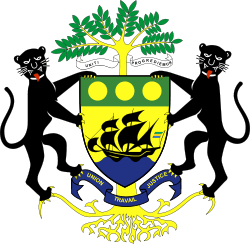Religion in Gabon
Major religions practiced in Gabon include Christianity (Roman Catholicism and Protestantism), Islam, and traditional indigenous religious beliefs.[1] Many people practice elements of both Christianity and traditional indigenous religious beliefs.[1] Approximately 73 percent of the population, including noncitizens, practice at least some elements of Christianity; 12 percent practice Islam (mainly Sunni); 10 percent practice traditional indigenous religious beliefs exclusively; and 5 percent practice no religion or are atheists.[1] Former president El Hadj Omar Bongo Ondimba was member of the Muslim minority.[1]
The BabongoHi are a forest people of Gabon on the west coast of equatorial Africa. They are originators of the Bwiti religion, based on consumption of the intoxicating hallucinogenic iboga plant. For comparison of its spiritual and cultural roles, see ayahuasca aka yage, also botanical alkaloid based, and cannabis in the Rastafari movement. Other peoples in Gabon have combined traditional Bwiti practices with animism and Christian concepts to produce a very different modern form of Bwiti.
The Bwiti rituals form part of the intitation into the Babongo people. Babonga peoples lives are highly ritualised through dance, music and ceremony associated with natural forces and jungle animals. Foreign missionaries are active in the country.[1] The Constitution provides for freedom of religion, and the Government generally respects this right in practice.[1] The US government received no reports of societal abuses or discrimination based on religious belief or practice during 2007.[1]
See also
References
- ↑ 1.0 1.1 1.2 1.3 1.4 1.5 1.6 International Religious Freedom Report 2007: Gabon. United States Bureau of Democracy, Human Rights and Labor (September 14, 2007). This article incorporates text from this source, which is in the public domain.
| |||||||||||||||||||||||||||||||||||||
